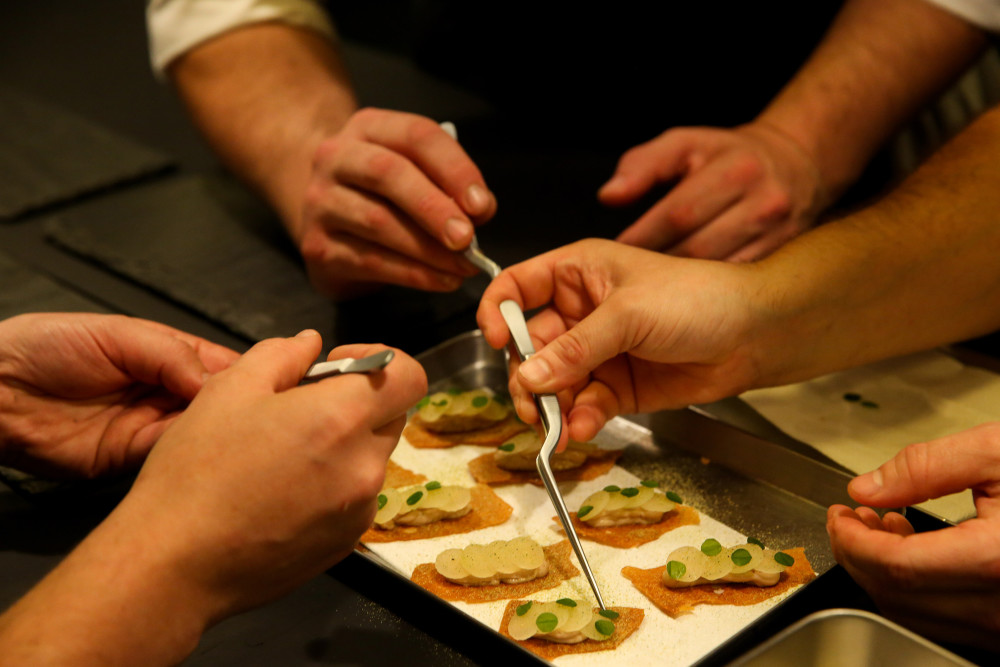By Greg Trotter
Chicago Tribune.
CHICAGO
Ariane Daguin, a native Frenchwoman who runs the leading distributor of foie gras in the U.S., once declared in an interview that animals have no soul.
Daguin, co-founder and CEO of D’Artagnan, grinned a bit sheepishly and dropped her head into her hands when asked about it while recently in Chicago.
“Everyone was looking at me like ‘Why did you say that?'” Daguin said. “I was raised Catholic. … When you are a Catholic in France, you learn that animals have no souls. If that wasn’t the case, we couldn’t eat an animal.”
Such an explanation is unlikely to win over foes. But that’s not a concern for Daguin, whose company supplies high-end, antibiotic-free meat for some of Chicago’s swankiest restaurants, including three-star Michelin winners Alinea and Grace.
Today, Chicago is the fastest-growing market for the New Jersey-based D’Artagnan, which also sells gourmet products such as organic chickens, duck confit, venison chops and wild boar.
More than seven years ago, Chicago aldermen lifted the city’s ban on foie gras, the culmination of a much publicized battle pitting gourmands against animal rights activists.
That was a “huge” moment for D’Artagnan, which was founded in 1985 and has operated in Chicago for the past four years, Daguin said. Foie gras sales represent only about 6 percent of the $14 million in projected overall revenues in Chicago this year, she said. Nationally, D’Artagnan’s revenues are expected to reach $100 million.
But the controversial delicacy remains an important line in the sand for Daguin, who sees activists’ opposition as an affront to both her business and her family’s culinary tradition spanning seven generations in southwest France.
“Foie gras is just a battle and it became important because it’s a battle,” she said. “But if we don’t fight for that, they’re going to go to chicken, go to beef, and they’re going to end up making us vegetarians. And to me, that’s wrong.”
Much of the controversy over foie gras centers on the process of force-feeding ducks in order to enlarge their livers. Those entrenched on opposite sides of the debate haven’t budged much since the Chicago ban was lifted.
“(Shoving) a pipe down a bird’s throat multiple times a day to force him to eat vastly more than he’d normally consume is cruel and rightly banned in more than a dozen nations,” said Paul Shapiro, vice president of farm animal protection for the Humane Society of the United States, in an email.
“Most people wouldn’t want to eat any part of a diseased animal, yet in the case of foie gras, it’s the diseased organ itself on which consumers dine,” he said.
Daguin and her allies have maintained that the animals are not stressed in the process and that the livers are not diseased.
And so the debate goes.
Chef Doug Psaltis serves D’Artagnan’s foie gras as an appetizer at his RPM Steak, though he acknowledged it can be a polarizing menu item. He also uses D’Artagnan’s Green Circle Chickens, free-range birds that are fed vegetable scraps, among other products. Psaltis called it the “best quality chicken I’ve ever tasted.”
Psaltis agreed with Daguin’s assessment that the growth of her company in the Chicago market reflected the increasing sophistication of the city’s culinary scene.
“It’s just exploding and as it explodes, we need someone like D’Artagnan to help make it happen,” the chef said of Chicago’s food scene.
Currently, the growth of D’Artagnan’s business has been driven by chefs, but the company hopes to expand into more grocery stores in the coming years. In general, Chicago market sales are projected to almost double within the next three years.
Last year, D’Artagnan purchased a 22,000-square-foot warehouse in suburban Chicago, relocating from a smaller facility.
At Treasure Island Foods, a European specialty grocery chain in Chicago, some D’Artagnan products, like duck confit and duck bacon, sell year-round, said Allen Schaffer, Treasure Island’s meat and seafood buyer. Others, like the foie gras, tend to be holiday offerings, he said.
It helps Treasure Island stand apart, Schaffer said. “Everyone can get Oscar Mayer bacon,” he said. “Not everyone can get D’Artagnan duck bacon.”
Both Psaltis and Schaffer said their customers increasingly want organic and antibiotic-free meat, another development that’s helped D’Artagnan, which only contracts with small farms that use no hormones or antibiotics.
For Daguin, though, her company’s priority has always been the “excellence on the plate.”
Like the activists, Daguin said she, too, is opposed to factory farming and animal cruelty. “But then at the end, we kill the animal. That’s the big difference.”














































































































































































































































































































































































